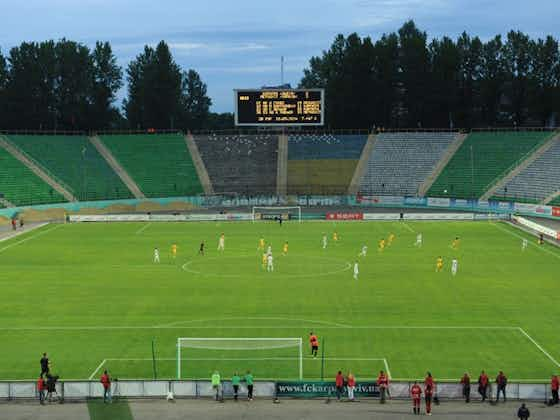Futbolgrad
·11 June 2019
Karpaty Lviv and the Decline to Mediocrity

Futbolgrad
·11 June 2019

The pride of Western Ukraine, Karpaty Lviv has a storied history. From Soviet silverware and European football to fighting relegation, this is the story of FC Karpaty Lviv’s decline to mediocrity.
A city bursting with history and culture, Lviv was founded in the 13th century by King Danylo Halystkyi. Named after his son, Lev, the city of lions continues to roar in the 21st century. Whether it be Lviv, Lvov, Lwów or Lemberg, the city of Lviv has an exquisite nature in which history and culture combine to embrace and tell the story of years gone by.
Established on 18 January 1963, Karpaty Lviv prides itself on the city it represents. While they are one of the youngest clubs in Ukraine, at least compared to Dynamo Kyiv and Shakhtar Donetsk, the lions aspire and strive to compete with the best in their home country. Boasting the prowess of being Western Ukraine’s most successful and popular club, Karpaty Lviv rightfully regards itself as one of the cornerstones of Ukrainian football.

During the year of its establishment, Karpaty was born during the reformation of the Football Federation of the USSR in 1963. While the city of Lviv had at least two teams in Silmash Lviv and SKA Lviv, the city administration realised that they required a team that best represented the city at the required standard.
A meeting at the building of the Regional Council of Trade Unions between the council, federation, director of the city plant, and coaches of Silmash Lviv was held in order to discuss the situation and ultimately form the club that became Karpaty Lviv. While commonly known names such as Spartak, Dynamo, and Halychyna were suggested, the name Karpaty was agreed upon as they felt it best represented the region and city.
One year after its inception, the Western Ukrainian club soon found itself starting on a winning foot. Playing their first game on 14 April 1964, against Zenit Izhevsk, Karpaty Lviv were victorious in what would kickstart a rollercoaster journey. Supplemented by another victory in their first official game against Lokomotiv Gomel, the lions were hungry and ready to roar.
Initially plying their craft in the third tier of Soviet football, Karpaty Lviv reached the heights of the second tier in 1968. It was time for the Western Ukrainian club to establish themselves in the Soviet First League. However, no one could have predicted what was to come for the lions.
The Soviet Cup, founded in 1936, was a historic domestic competition in which the victors would be awarded qualification to the UEFA Cup Winners’ Cup. An opportunity to represent Eastern Europe and showcase what the Soviet Union had to offer, much of those competing in the cup competition strived to make an everlasting mark on the footballing world.
With the odds stacked against them due to playing in the second tier, Karpaty Lviv’s path to glory was one of difficulty and challenges. Facing stalwarts of Soviet football such as Ararat Yerevan and Chornomorets Odesa along the way, Karpaty soon found themselves in the final of the cup after securing victories against Trud Voronezh in the quarterfinal and MFC Mykolaiv.

Facing FC SKA Rostov-on-Don at Lenin’s Stadium, currently known as the Luzhniki Stadium, Karpaty Lviv faced a David versus Goliath situation in the Soviet Cup. Regarded as one of the Soviet Union’s strongest teams in the 1960s, the army team hailing from Rostov were clearly the favourites. Taking the lead after twenty minutes played, it appeared that SKA Rostov would ultimately seal Karpaty’s fate. However, inspired and determined to succeed in the competition, Karpaty, however, wouldn’t give up.
Achieving the unthinkable during the era of the Soviet Union, Kaparty Lviv’s Soviet silverware proudly encapsulates the determined nature of the club hailing from Western Ukraine. The downfall of the Soviet Union brought a new era of football to those that made up the former communist entity. With independent leagues being established, teams now had the opportunity to compete against teams from within their country on a competitive and widespread scale.
With the glory years of 1969 firmly behind them, the lions were aspiring for greater things as a new period dawned upon Ukraine.
Established in the spring of 1992, the Ukrainian Vyshcha Liha consisted of twenty teams. Divided into two groups, the last three from each group would be relegated and replaced by the two best teams from the league below. As a result, sixteen teams would battle to become the first champions of the Vyshcha Liha.
Placed into Group A with teams such as Tavriya Simferopol, Shakhtar Donetsk, and Chornomorets Odesa, Karpaty Lviv had a difficult task on their hands. Playing a total of eighteen fixtures during the inaugural season of Ukraine’s independent league, each team had to ensure that they performed to the standard required. Otherwise there would be limited opportunities in competing for the title and could ultimately find themselves fighting relegation. Etching themselves into the history books, Tavriya Simferopol became the first champions of Ukraine; finishing top of Group A and beating Dynamo Kyiv in the Vyshcha Liha Final.
In the case of Karpaty Lviv and their inaugural campaign, the Lions finished sixth in Group A. Reflecting the somewhat chaotic nature during the inception of the Vyshcha Liha, teams such as Lviv were left hastily adapting to life in an independent Ukraine. The best Western Ukrainian club in their group, despite only finishing two points ahead of the relegation zone, Karpaty had the opportunity to take advantage of a fully-fledged league season in the next campaign.
The club reigning from Western Ukraine sought to prove that they were able to compete with Ukraine’s best. While teams such as Dynamo Kyiv, Shakhtar Donetsk, and others are regarded as former Soviet giants, the relatively young club had a difficult challenge on its hands. Embracing the symbol of the city they represent, Karpaty Lviv battled for their rightful place in Ukraine’s independent league.
Playing a total of thirty games during the 1992-93 season, Karpaty Lviv had a very even affair in the Vyshcha Liha. Winning ten, drawing then, losing ten, and finishing on thirty points, Myron Markevych coached his side to a lacklustre sixth place. However, the Lions’ silver lining came in the Ukrainian Cup.
Overcoming Evis Mykolaiv, SK Odessa, Metalurh Zaporizhya, and Torpedo Zaporizhya on the road to the Ukrainian Cup Final, Karpaty Lviv scored a total of twelve goals, putting them in prime position to take on Dynamo Kyiv.

Taking place at the Republican Stadium in Kyiv, the Ukrainian Cup Final of 1993 was an intriguing prospect. Featuring the giants of Dynamo Kyiv, the challenge facing Karpaty Lviv was reminiscent of David versus Goliath. Despite the Lions’ limited silverware, at least compared to their opponents, Karpaty were full of confidence.
Despite their confidence and fighting spirit, the might of Dynamo Kyiv proved too much for Karpaty Lviv. Taking the lead in first-half via a 23rd minute goal from Viktor Leonenko, the Kyivan’s increased their lead in the second half via former Karpaty Lviv player, Dmytro Topchiyev. Down but not out, the Lions sought to mount a comeback. Awarded a penalty in the 89th minute, Karpaty Lviv clawed back at Dynamo’s advantage. However, it was too little too late.
It wasn’t all doom and gloom for Karpaty, however. With the 1992-93 season coming to end, Dynamo Kyiv finished top of the table, earning a place in the UEFA Champions League. As a result, Karpaty Lviv earned qualification to the 1993-94 UEFA Cup Winners’ Cup. Unfortunately for Lviv, the story of defeat in the Ukrainian Cup Final would continue into European affairs.
Bowing out to Shelbourne F. C. in the qualifying round, Karpaty Lviv were left disappointed with their first appearance in European football since 1970. They wouldn’t return to Europe until 1999, where once again they would receive further disappointment.
The highlight of Karpaty Lviv’s performance in the Vyshcha Liha would come during the 1997-98 season. Finishing third, this would become the Lions’ highest ever finish in the top tier of Ukrainian football.
Despite the high of the 1997-98 season, Karpaty Lviv steadily declined as the 20thCentury came to an end. Finishing fourth and achieving qualification to the 1999-2000 UEFA Cup, the Lions once struggled on the European stage. Defeated in the first round, Lviv would have to wait eleven years until they would see a European competition once again.
Finishing tenth during the 2000-01 season, the break of the 20thCentury was one of despair and decline. Despite a slight resurgence in the seasons that followed, Karpaty Lviv fate was sealed during the 2003-04 season when the Lions were relegated to the Persha Liha. Losing a total of sixteen games, Lviv suffered their worst league performance since the establishment of the Vyshcha Liha.
Resigned to the Persha Liha, Karpaty had the opportunity to reform and bounce back to the top tier of Ukrainian football. However, it didn’t go exactly to plan. Despite the efforts of Lviv’s top scorer, Maksym Feschuk, the Western Ukrainian club finished sixth. Desired to get his side out of the second-tier quagmire, Yuriy Dyachuk-Stavytskyi ensured that he would coach his side to promotion the following season. Finishing second, Karpaty Lviv returned to the Vyshcha Liha.
Europe
Progressing each year since their return to the top tier of Ukrainian football, Karpaty Lviv soon found themselves returning to the European stage. Under the reformed Ukrainian Premier League, the Lions’ fifth place during the 2009-10 season was enough to secure a place in the 2010-11 UEFA Europa League Second Qualifying Round.
Facing KR Reykjavík, Karpaty Lviv swept past the Icelandic club, beating them 6-2 on aggregate. Progressing to the Third Qualifying Round, the Ukrainian club would face Zestafoni. Once again, the Lions were victorious, beating the Georgian club 2-0 on aggregate. Progressing further in the competition, Lviv faced Galatasaray in the Play-Off Round.
Drawing against the Turkish giants at the Ali Sami Yen Stadium, Karpaty had the away goal rule in their favour. Scoring two goals in Istanbul, the Ukrainian club had the advantage going into the second leg. After a goalless first half, affairs started to heat up in the second half. Sent off with nineteen minutes remaining, Serhiy Kuznetsov left his side with a battle on their hands. Going down to the wire, fans of Karpaty Lviv were hoping that the European dream would continue.
Scoring in the ninety-first minute, Aydın Yılmaz all but sealed Galatasary’s progression to the next stage of the Europa League. The hopes and dreams of the home side smashed, it appeared that the Ukrainian club would be bowing out of the competition. However, it’s not over until it’s over. Requiring a goal to continue their European journey, Karpaty Lviv fought to the bitter end.
Artem Fedetskyi, on loan from Shakhtar Donetsk, would be the hero the Lions were looking for. Etching himself into the history of Karpaty Lviv, the Ukrainian defender scored in the ninety-fourth. Achieving the unthinkable against the Turkish giants, Lviv, with Oleg Kononov at the helm, found themselves advancing to the Group Stage.
Drawn into a group containing Paris Saint-Germain, Sevilla, and Borussia Dortmund, the challenge couldn’t have been harder for Karpaty Lviv. While it proved too much for the Ukrainian club, they didn’t give in and ultimately showcased the passion and roar of what it means to wear the green and white shirt.
Losing a total of five matches in the group stage, Karpaty saved their best for last. Consigned to bottom of Group J, the Lions faced Paris Saint-Germain in what would be the club’s most robust performance of their campaign. Playing at the Ukraina Stadium, there was an opportunity for Karpaty to go out with their heads held high. Representing Ukraine on the European stage is one of immense pride, especially when football in the country isn’t as it once was.

Taking the lead via Péguy Luyindula, Paris were on course to another victory. However, Karpaty Lviv weren’t going to give in that easily. Challenging his performance against Galatasary, Artem Fedetskyi scored in the forty-fifth minute, securing his sides only point in the group stage. While they may have finished bottom of Group J, the Lions’ emotional journey was something to be proud of. The European campaign of 2010-11, despite the achievement of reaching the group stage, represented a period in which Karpaty Lviv would gradually decline into the depths of mediocrity.
The spirit of 1969 firmly in the past, Karpaty Lviv descended into a situation in which they’ve not recovered. While not possessing the extensive history and silverware compared to that of Dynamo Kyiv and Shakhtar Donetsk, Karpaty are immensely proud of their journey and the story it tells.
Instability and the continuous coaching merry-go-round surrounding the club has ultimately cost it greatly. Since their fifth-place finishes during the 2009-10 and 2010-11 season, Lviv have been unable to return to such a position in the Ukrainian Premier League. Led to European achievement under Oleg Kononov, Karpaty Lviv have since had a total of twenty managers.
Fast-forward to the 2018-19 season, Karpaty once again find themselves fighting for survival. In a state of disrepair and instability, the once proud club is crumbling. Plastering over the cracks has ultimately caused more harm than good.
Supplementing the chaos in Western Ukraine, Fabri resigned as head coach of Karpaty Lviv with one fixture remaining in the league. Fighting to remain in the Ukrainian Premier League, confined to the relegation play-offs, another coach has been unable to solve the underlying problems at the faltering club. Despite retaining their top tier status after victory in the play-offs, Karpaty Lviv’s turmoil is one that could continue for the foreseeable future.
Further adding to the suffering of the storied club, Karpaty, based on league position and performance, can no longer pride themselves on being the number one club in Lviv. Despite being newly promoted to the Ukrainian Premier League, FC Lviv, founded in 2006, surprised many. Securing Championship Group status at the first time of asking, Lviv earned bragging rights in the city of lions.
Whether the trajectory of FC Lviv continues, remains to be seen, however, the decline of Karpaty Lviv has ultimately provided an opportunity for their city rivals.
For Ukrainian football to flourish, especially in a challenging period which grips the country, clubs such a Karpaty Lviv are required to adapt and overcome. Reluctancy to change, coinciding with the lack of stability and vision, has ultimately sent a prestigious club into the depths of which it may never recover.
Callum Seniuk is a History graduate from the United Kingdom who is an avid watcher of the Bundesliga. Losing his passion for the Premier League, Callum quickly found himself developing his love for the Bundesliga and German football. Channelling his Ukrainian heritage, Callum also follows and keeps track of Ukrainian Football. Follow Callum on Twitter @CallumSeniuk






























































